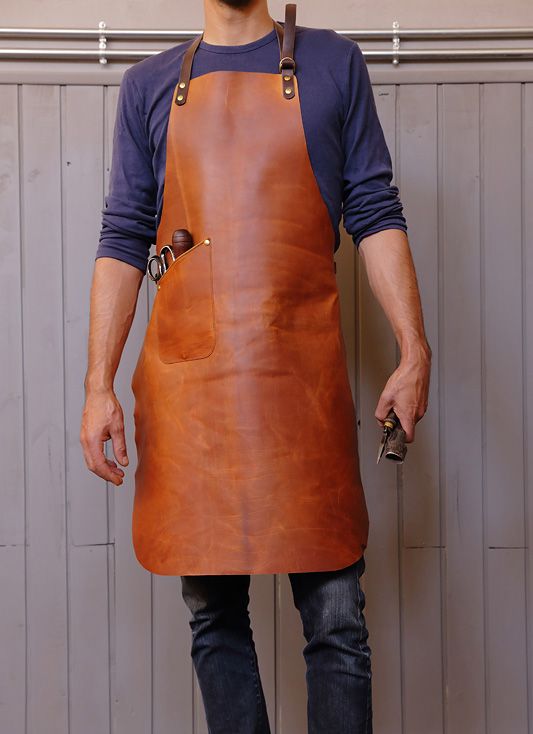Leather aprons, a symbol of tradition, durability, and craftsmanship, have long been an essential garment for artisans, craftsmen, and professionals across various industries. From blacksmiths to chefs, baristas to carpenters, leather aprons offer not only protection but also a sense of identity and pride in one’s craft. This article delves into the rich history, diverse uses, and enduring appeal of leather aprons, exploring why they continue to be a favored choice among professionals and hobbyists alike.
A Historical Overview of Leather Aprons
The use of leather aprons dates back centuries, with their origins rooted in the practical needs of workers in trades such as blacksmithing, woodworking, and shoemaking. Leather, being a tough and durable material, provided a level of protection that was unmatched by other fabrics. It shielded the wearer from heat, sparks, and sharp tools, making it an invaluable piece of equipment for those working in hazardous environments.
In medieval Europe, blacksmiths and other metalworkers commonly wore leather aprons. These aprons were typically made from thick, untreated hides that could withstand the intense heat and potential burns from molten metal. The leather was also resistant to cuts and punctures, which were common risks in these trades. Over time, the design of leather aprons evolved to suit the specific needs of various professions, leading to the development of aprons with specialized features such as pockets, loops, and reinforced areas.
The tradition of wearing leather aprons was not limited to Europe. In Japan, for example, leather aprons were used by swordsmiths and other craftsmen who required protection from the heat and sharp tools they worked with. Similarly, in North America, leather aprons were a staple among pioneers and early settlers who relied on them for protection during tasks such as woodworking, tanning, and butchering.
The Modern Revival of Leather Aprons
In recent years, there has been a resurgence in the popularity of leather aprons, driven in part by the growing interest in handmade goods and artisanal crafts. This revival is not merely a nostalgic nod to the past but a recognition of the practical benefits and timeless appeal of leather aprons. Today, leather aprons are worn by a wide range of professionals, from baristas and bartenders to chefs and tattoo artists, each appreciating the blend of functionality and style that a leather apron provides.
One of the key reasons for the renewed interest in leather aprons is the rise of the “maker” culture, which celebrates the art of craftsmanship and the value of handmade products. Makers, whether they are working with wood, metal, or food, often choose leather aprons because they embody the principles of durability, quality, and authenticity. A well-crafted leather apron is not just a protective garment but a statement of one’s commitment to their craft.
Moreover, leather aprons have become a fashionable accessory in many industries, particularly in the culinary and hospitality sectors. Chefs and baristas, in particular, have embraced leather aprons as part of their professional attire, recognizing that they not only provide practical benefits but also contribute to a polished and professional appearance. The rich texture and natural patina of leather add a touch of elegance and sophistication, setting the wearer apart and creating a strong visual identity.
The Unique Qualities of Leather Aprons
Leather aprons offer a range of qualities that make them a superior choice for many professionals. The most notable of these qualities is durability. Unlike fabric aprons, which can wear out quickly with frequent use, leather aprons are built to last. High-quality leather can withstand years of wear and tear, developing a unique character over time as it ages. This longevity makes leather aprons a worthwhile investment, especially for those who rely on them for daily use.
Another important quality of leather aprons is their ability to provide protection. Leather is naturally resistant to heat, making it an ideal material for those who work with hot surfaces or open flames. This is why leather aprons are commonly used by blacksmiths, welders, and chefs who need protection from burns and splatters. Additionally, leather is resistant to cuts and punctures, offering an extra layer of safety for those who work with sharp tools or machinery.
Comfort is another significant advantage of leather aprons. Despite their toughness, leather aprons can be surprisingly comfortable to wear. Over time, the leather conforms to the wearer’s body, creating a custom fit that is both supportive and comfortable. Many leather aprons are also designed with adjustable straps and ergonomic features, ensuring that they can be worn for long periods without causing discomfort.
Leather aprons also offer a level of versatility that is unmatched by other materials. They are suitable for a wide range of tasks and environments, from the kitchen to the workshop, and can be customized with various features to meet the specific needs of the wearer. Pockets, loops, and reinforced areas can be added to accommodate tools and equipment, making the apron not just a protective garment but a functional tool in its own right.
Choosing the Right Leather Apron
When selecting a leather apron, there are several factors to consider to ensure that you choose the right one for your needs. The first consideration is the type of leather. Full-grain leather is often regarded as the best quality, as it is the most durable and develops a beautiful patina over time. Top-grain leather is also a good choice, offering a balance between durability and flexibility. Split leather, while less expensive, is not as durable and may not offer the same level of protection as full-grain or top-grain leather.
Another important factor is the thickness of the leather. Thicker leather offers more protection and durability, making it suitable for heavy-duty tasks such as metalworking or woodworking. However, it may also be heavier and less flexible, which could be a consideration for those who need to wear the apron for extended periods. Thinner leather, on the other hand, is lighter and more flexible, making it a better choice for tasks that require a greater range of motion, such as cooking or bartending.
The design of the apron is also crucial. Look for an apron with adjustable straps that allow you to achieve a comfortable fit. The straps should be made from durable materials, such as leather or high-quality fabric, and should be securely attached to the apron to prevent them from breaking or coming loose. Consider the placement and size of pockets and loops, ensuring that they are positioned conveniently for easy access to tools and equipment.
Finally, consider the aesthetics of the apron. Leather aprons are available in a range of colors and finishes, from natural tan to rich brown and black. Choose a color and finish that suits your personal style and the environment in which you will be wearing the apron. A well-chosen leather apron can enhance your professional appearance and make a strong impression on clients and colleagues alike.
Caring for Your Leather Apron
Proper care and maintenance are essential to ensure that your leather apron lasts for many years. Leather is a natural material that requires regular conditioning to prevent it from drying out and cracking. Use a high-quality leather conditioner or oil to keep the leather soft and supple, applying it periodically as needed. Avoid exposing the apron to excessive moisture, as this can cause the leather to become stiff and brittle. If the apron does get wet, allow it to air dry naturally, away from direct heat sources.
Cleaning your leather apron is also important to maintain its appearance and longevity. Wipe down the apron with a damp cloth to remove any dirt or debris, and use a leather cleaner if necessary to remove stubborn stains. Avoid using harsh chemicals or abrasive cleaners, as these can damage the leather. With proper care, your leather apron will develop a rich patina over time, enhancing its beauty and character.
Conclusion
Leather aprons have stood the test of time, continuing to be a preferred choice for professionals and artisans across various industries. Their durability, protective qualities, and timeless style make them a valuable investment for anyone who values quality and craftsmanship. Whether you are a chef, carpenter, blacksmith, or hobbyist, a leather apron offers both practical benefits and a sense of pride in your work. As the maker culture continues to thrive, the leather apron remains a symbol of the enduring appeal of handmade goods and the art of craftsmanship.




